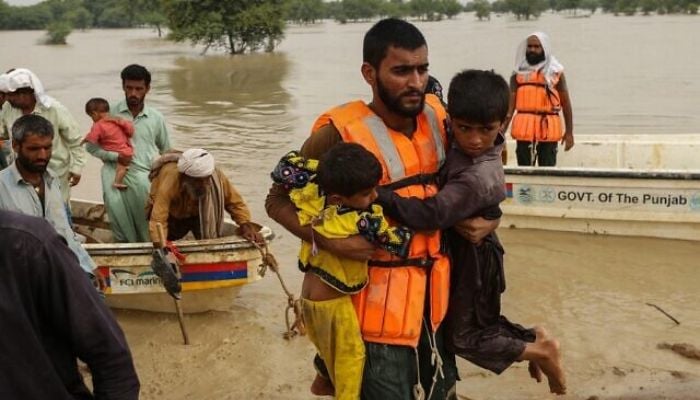[ad_1]
United Nations: The impact of climate change on health If carbon emissions remain high, they could be twice as deadly as cancer in some parts of the world, including Pakistan, according to new data from the United Nations Development Program and the Climate Impact Laboratory.
The new data It demonstrates the need to act quickly, not only to mitigate climate change but also to adapt to its consequences.
For example, in Faisalabad, Pakistan, even with moderate mitigation, additional deaths due to climate change will average 36 per 100,000 people each year between 2020-2039, according to the data. Without greatly expanding adaptation efforts, Faisalabad can expect annual death rates linked to climate change to nearly double, to 67 deaths per 100,000 by mid-century. Almost as lethal increase as strokes, currently the third leading cause of death in Pakistan.
“As we face the punishing effects of global climate change, it can be easy to ask whether efforts to reduce emissions by individual countries, states or cities really make a difference. This platform shows the direct role these efforts play in shaping our collective future,” Hannah Hess of the Climate Impact Lab, Associate Director in the Rhodium Group.
In Dhaka, Bangladesh, where under a very high emissions scenario by 2100, additional deaths from climate change could rise to nearly twice the country’s current annual death rate from all cancers, and 10 times the annual death rate from traffic accidents, According to the data. .
“Due to human action, the concentration of carbon dioxide in our atmosphere is reaching dangerous levels, driving global warming and amplifying the frequency and intensity of extreme events,” says the newly launched Human Climate Horizons platform, adding that without concerted and urgent action Climate change will exacerbate inequality and uneven development.
Based on analyzes of the 2020, 2021 and 2022 Human Development Reports – fueled by a cutting-edge stream of frontier research – the data shows how climate change may affect people’s lives – from mortality to livelihoods and energy use.
Although higher temperatures and a warmer climate put the cardiovascular and respiratory systems under stress everywhere, results will vary between places, according to which communities have the resources to adapt and those that don’t.
Data shows that climate change could increase death rates in Faisalabad, Pakistan by nearly 67 deaths per 100,000 residents – causing more deaths from strokes, the third leading cause of death in the country.
In Riyadh, Saudi Arabia, however, high incomes can keep the death toll to 35 per 100,000, which is still more deadly than Alzheimer’s disease – the sixth leading cause of death globally.
Since the late 19th century, Earth’s average temperature has risen by about 1.2 degrees Celsius, altering the planet’s entire surface area, according to the research.
However, billions live in regions that have already seen warming above the global average.
As an example, the platform pointed to Maracaibo, Venezuela, noting that in the 1990s it averaged 62 days annually with temperatures in excess of 35 degrees Celsius. However, by the middle of the century, this number is likely to increase to 201 days.
The United Nations Development Program said the availability of electricity, and the fuel used to generate it to run air conditioners and heaters, play an important role in our ability to deal with temperature extremes.
However, the effects of climate change on energy use will vary locally, as individuals, communities, and businesses adapt to conditions using available resources.
In Jakarta, for example, electricity consumption is expected to increase in response to warmer temperatures by about one-third of current household consumption in Indonesia. This will require critical additional infrastructure planning.
Frequent and severe temperature extremes also affect livelihoods, affecting the ability to perform tasks and affecting work intensity and duration.
According to the platform’s data, “the impact of climate change varies across sectors of the economy, with workers in high-risk, weather-exposed industries such as agriculture, construction, mining, and manufacturing affected.”
In Niamey, Niger, in sectors such as construction, mining, and manufacturing, excess heat was responsible for 36 fewer hours worked per year, leading to 2.5 percent losses in the country’s future GDP.
In Niger, as in other parts of the Sahel region, climatic shocks have led to frequent droughts with devastating effects on already vulnerable populations in the region.
Climate change is not evenly distributed globally and will lead to a significant increase in inequality over the coming years and decades.
But by highlighting that the future is not predetermined, UNDP hopes that information can empower people everywhere, to ramp up climate action.
Meanwhile, the UNDP also launched How a Just Transition Can Advance the Paris Agreement report this week, which highlights the need to embrace the “Green Revolution” – or risk rising social inequality, civil unrest and economic losses.
Ahead of the United Nations climate conference, COP27, which kicked off on Sunday in Sharm El-Sheikh, Egypt, the report highlights the importance of a “just and equitable” transition to achieving the climate goals set out in the Paris Agreement.
UNDP Administrator Achim Steiner said the report provides “sobering insights into how we can accelerate the momentum around just and equitable transition to the energy sector and beyond.”
The report analyzes both enhanced short-term climate pledges, known as Nationally Determined Contributions (NDCs), and longer-term strategies in which countries develop plans to reduce greenhouse gas emissions to net zero.
Encouragingly, 72% of countries with improved NDCs report a just transition linking them to social and economic considerations, while 66% suggest concrete actions and measures that take into account climate justice.
However, they fail to make linkages with the Sustainable Development Goals (SDGs) or gender equality in short- or long-term climate plans — missing a major opportunity, the UNDP said.
“As climate change intensifies and the world faces a massive energy crisis… decoupling from fossil fuels and investing in the green energy infrastructure of tomorrow…[is] The only logical economic choice,” Steiner said.
[ad_2]
Source link

